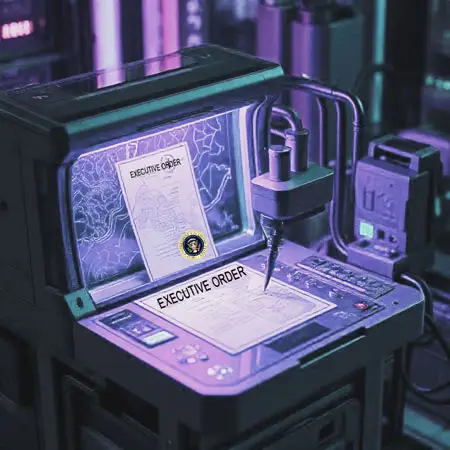(PCC)Many view Joe Biden as a frail, dying, helpless old man, which in many aspects may be very accurate, but few are viewing the power of his conservator; that is where this gets dicey.
Here is the question the Washington hacks are afraid to ask: Can President Biden’s conservator sue over autopen signatures? Legal standing explained, and to be honest, they never saw this coming.
Recently, questions surrounding presidential authority and executive function have occasionally intersected with technological shortcuts, none more intriguing than the use of an autopen to sign legislation. U.S. presidents have used the autopen, a mechanical device that can reproduce a person’s signature, to sign bills into law when they are not physically present.
But what if the president uses this tool without proper authorization or against his will? Should President Joe Biden become declared legally incapacitated, could a court-appointed conservator file a lawsuit against the responsible individuals? Could he sue personally as a retired US president?
Does Joe Biden have to be deceased before a conservator takes legal authority over his affairs? No, Joe Biden does not have to be dead for a conservator (also called a guardian in some jurisdictions) to transact on his behalf. A conservator is appointed only while a person is alive but is unable to manage their personal or financial affairs due to incapacity, mental, physical, or cognitive.
Here’s how it works in legal terms:
Conservatorship Basics
A conservator is appointed by a court when an adult is found to be incapacitated, meaning they lack the ability to understand or make decisions for themselves.
This can happen due to:
- Dementia or Alzheimer’s
- Stroke or brain injury
- Severe mental illness
- Other cognitive impairments
In President Biden’s case, if he were determined by a court to be legally incapacitated, a conservator of the person and/or estate could be appointed to:
- Make medical decisions (conservator of the person)
- Manage financial or legal matters (conservator of the estate)
The conservator has legal status while Joe Biden is living.
If the court appoints a conservator,
- Biden remains alive and retains some civil rights, depending on the court’s order.
- The conservator steps into the legal role for specific transactions, such as signing contracts, initiating lawsuits, or managing assets.
- Biden would not need to be dead, in fact, conservatorship ends when he dies.
A special case is developing because Joe Biden was a sitting President while transactions on his and the country’s behalf were executed.
This is where it gets more complicated. For a sitting U.S. president, there’s a constitutional mechanism, Section 4 of the 25th Amendment, to handle incapacity. This is separate from a private or state court’s conservatorship process.
Understanding the role of the autopen is not a new idea. Both Democratic and Republican administrations have used the autopen, with President Obama most notably using it in 2011 to sign a Patriot Act extension while abroad. At the time, the Office of Legal Counsel (OLC) issued a memo affirming its legality, provided the president expressly authorized its use.
Key to this legality is intent and authorization. If the president directs a staff member to use the autopen, it’s considered valid under Article I, Section 7 of the Constitution, which requires bills to be “signed” by the president.
But what if the president did not authorize it or lacked the mental capacity to do so?
Scenario 1: Unauthorized Autopen Use Without Conservatorship
If individuals used the autopen without President Biden’s explicit or implied consent, there could be a breach of Article I, Section 7, potentially invalidating the legislation. However, whether the president can personally sue depends on:
Here ‘s the standing:
Under Article III of the Constitution, to sue in federal court, a plaintiff must show:
- An injury-in-fact,
- A causal connection to the conduct,
- That the injury can be redressed by the court.
President Biden might argue:
- The breach of his constitutional prerogative to sign or veto bills has caused damage to the integrity of his office.
- Causation: Specific individuals used the autopen without authorization.
- Redress: He seeks a declaration invalidating the legislation or disciplining the responsible parties.
But courts have historically been reluctant to entertain lawsuits where a sitting president claims injury from his administration’s acts. Courts often avoid such intra-executive conflicts as non-justiciable political questions.
Scenario 2: If a Conservator Is appointed,
If a court finds Joe Biden legally incapacitated, it empowers a conservator (or guardian) to represent him in legal matters. In that case:
- The conservator could sue individuals for fraud, forgery, or unauthorized exercise of federal power.
- The case would shift from a constitutional dispute to a question of personal harm, especially if the autopen was used to bypass the president’s expressed wishes.
This claim might have more traction if framed as a tort or abuse of office that caused direct harm to the president’s legal authority, reputation, or legacy.
Federal vs. Personal Legal Claims
| Legal Path | Can Biden Sue? | Legal Basis | Challenges |
| Via Conservator | More likely (if appointed) | Tort, constitutional injury, fraud, abuse of signature rights, elder abuse | Requires incapacity determination |
| Federally | “subordinates” could be fully criminal libel, | Executive authority question | Courts may see it as intra-branch issue and refer to the SCOTUS |
Could Congress or the Courts Step In?
Yes. Congress could:
- Investigate via hearings.
- Pass a law clarifying autopen use limits.
Courts could:
- Hear a challenge to a specific law passed via unauthorized autopen signature, especially if a third party (e.g., a citizen or affected company) sues under separation of powers or Administrative Procedure Act claims.
But what about Jill Biden? Does she have authority?
- Power of Attorney (POA)
If Joe Biden previously signed a durable power of attorney naming Jill Biden as his agent, she could:
- Make financial or legal decisions on his behalf.
- Act without going to court.
- You must still adhere to his established desires and prioritize his welfare.
BUT:
- POA only works if Joe was mentally competent at the time of signing.
- It does not give authority over presidential powers, just personal/legal/financial matters.
- Healthcare Proxy/Medical Power of Attorney
If Joe Biden signed a medical POA or designated Jill as his healthcare proxy, she could:
- Make medical decisions if he becomes incapacitated.
- Work with doctors and hospitals.
Again, this is private and personal authority—not public or political.
- Spouse Status Alone Has No authority.
Being his wife does not give her:
- She is not granted the authority to sign contracts on his behalf.
- She does not have the authority to file lawsuits or represent him in court.
- He also has the authority to make medical or financial decisions, unless a POA or court order is in place.
- Conservatorship (If No POA Exists)
If Biden were incapacitated and had no valid POA, Jill would need to:
- Jill would need to petition the court for the appointment of his legal conservator or guardian.
- This involves a court hearing, medical evaluations, and possible objections from others (e.g., children or Cabinet members).
- Even then, she’d only control private affairs, unless the 25th Amendment process addressed public duties.
- Presidential Authority
Jill Biden cannot:
- Sign laws
- Issue executive orders
- Delegate or withhold official powers
- Invoke or block the 25th Amendment
Only constitutional officers (VP, Cabinet, Congress) are involved in presidential incapacity or succession—not family.
Bottom Line
- Jill Biden has no automatic legal authority.
- She could act if Joe previously authorized her (via POA).
- Otherwise, she’d need a court to appoint her conservator.
- She cannot act on behalf of the president in his official capacity under the Constitution.
- Jil Biden does not hold an MD but a 1-year EdD therefore unable to manage her husband’s health challenges.
Furthermore, the issue arises if Jill Biden was complicit in the autopen scandal if any crime were to have been committed. Should this be the case, the removal of Jill Biden’s authority over the Biden estate and her role as a conservator would follow.
While President Biden (or a conservator) could theoretically sue over unauthorized autopen use, the legal standing to do so personally is limited by constitutional doctrine and executive immunity. A conservator would have a stronger personal claim, particularly if mental capacity is at issue.
Final Word: The Autopen scandal did not only harm America; it also stole Joe Biden’s name and authority.
Steve Eichler, JD, is a graduate of Trinity Law School holding a doctorate in international law.



